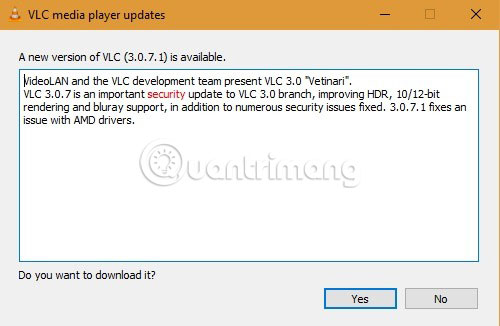Learn new vulnerabilities in VLC that allow hackers to access computers
If you have VLC media player on your computer, you must immediately upgrade to the latest version, 3.0.7 or higher. There are two new exploits that allow hackers to use vulnerable versions of VLC to crash your system and execute their malicious code remotely.
Very typical attack method. After you download the attack file AVI or MKV, it will give hackers full control over the computer whenever you play video on VLC. These attack files may originate from torrent videos as well as Facebook, Twitter or Instagram.
It sounds very dangerous, right? Yes, it's because VLC's "father" of Videolan has issued a warning about this issue. In the past few days, many users have noticed the update requirements whenever they open VLC Media Player.
Cảnh báo: Không sử dụng giá trị này trước khi bạn cài đặt phiên bản này mới, 3.0.7.

What really happened?
Occasionally this month, security researchers at Pen Test Partners developed a new exploit method aimed at older VLC versions, including 3.0.6. They call it CVE-2019-12874, which uses fuzzing technology to generate invalid or random data.
Basically, VLC is a complex software, using a large number of third-party libraries contributed by open source product developers. One of these functions, called demux / mkv, is in ReadFrames, which can be run in the background of VLC files in Simple Preferences. This feature of VLC is easily defeated by new attack vectors.

When the attack file downloads the system, you will see VLC play for 5 seconds, exit and then repeat. This problem will never end.
According to the partners of the Pen Test, so far they have implemented 1 million times this exploit method and had 1547 successful cases. So far, many of the hundreds of millions of VLC users don't know about this threat.
In addition to the remote incident exploitation above, another buffer overflow vulnerability, named CVE-2019-5439, was also revealed on June 12, 2019. This vulnerability also uses the ReadFrame function of VLC to prompt users to download specially created AVI or MKV files. If a successful buffer overflow is caused, hackers can cause the system to crash or remotely exploit.
How does the latest VLC Media Player version solve these problems?
According to the latest release of VLC, version 3.0.7 fixes the problem by fixing buffer overflow errors for some file extensions, including MP4, MKV, AVI and NSC. It also prevents infinite loops from running when an invalid item is playing.
Although the patch is available, both CVE-2019-5439 and CVE-2019-12874 are still pending analysis by security researchers. However, at least you should download the latest VLC version from Help / Check for Updates . The download will take place automatically.
Once completed, you should upgrade VLC from previous settings.
Please make sure that you download the latest version from time to time, as new errors may occur in the future and you don't know anything about it. Also, do not open any unreliable files on VLC in the present or future.
Alternatives to VLC Media Player
If you feel that VLC Media Player is not worth the risk, you may want to consider alternatives, including KM Player, Microsoft Photos, DivX and Windows Media Player. All of these options were created to run the latest h.265 codec and are great for HD video, as well as Full HD.
Have you noticed this latest vulnerability in VLC Media Player or is it the first time you've heard of it? What is your favorite media player? Share ideas with people in the comment section below, if you have problems with VLC or other media players in the past.
You should read it
- The best security tools for 2010
- AMD CPUs also have security vulnerabilities that have existed for many years now!
- Instructions to remove the fake Desktop Security 2010 application
- Apple releases iOS 14.4.2, iOS 12.5.2, and watchOS 7.3.3 updates that patch the critical zero-day vulnerability
- Critical Vulnerability Discovered in 3 WordPress Plugins, Affects 84,000 Websites
- Virus collection of 2010 from Panda Labs
- Instructions to remove fake Antivirus Pro 2010 security software
- Detected critical zero-day vulnerability on Adobe Reader
- Discovered a new zero-day vulnerability on macOS that allows attackers to run commands remotely
- Kaspersky launched Internet Security and Antivirus 2010 versions
- Instructions for removing fake Internet Security 2010 software
- Detecting zero-day vulnerability in the Dropbox 10 Windows app, users pay attention!
Maybe you are interested
4 rules to keep towels fragrant and clean Don't fall for these Reddit scams that are waiting to install malware on your computer! How to check MacBook battery status Latest Shindo Life Roblox Code and how to enter Evaluate the Snapdragon 860 gaming performance on the POCO X3 Pro Vsmart Star 3: Snapdragon 215, dual camera, 3500mAh battery, priced at 1.79 million
